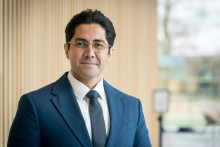Where are you from originally, and how long have you been here?
Cammers-Goodwin: ‘I’ve lived all over the US, from Massachusetts to Kentucky and California, among other places. I came to Enschede as a PhD student in 2018, and I’m now a post-doc in philosophy and ethics of technology.’
Gertz: ‘I’m originally from Boston, Massachusetts, and I’ve lived in London, Washington D.C., Tacoma, and in Michigan. Peter-Paul Verbeek invited me in 2015 to come here and lecture in philosophy of technology.’
How did you feel about Trump’s win?
Cammers- Goodwin: ‘The first time he was elected it felt kind of like a joke. He almost seemed surprised himself that he won. This time round, he went at it with more confidence, almost as if he feels he has a divine right to rule. Surviving all the criminal charges has strengthened him too, I think. He feels he can get away with anything. One of the root causes is our two-party system. The Democratic party hasn’t been successful in fulfilling the dreams and ideals of the people, such as free healthcare. And in the end, they’re driven by the finances of big corporations, too, just like the Republican party. I think people voted for change, just to shake things up. Not for Trump per se. If the Netherlands had a two-party system, I think people would be shocked how many would vote for Trump. The Netherlands isn’t as far off from the US as we think. Social media plays a big role in that. But let’s hope I’m wrong.’
Gertz: ‘In an interview by the local TV station here in 2016 I surprised everyone by saying that I thought Trump could win. Everyone just sort of took for granted it wouldn't happen. Same with Brexit. This second term does not surprise me. There’s this right-wing trend across Europe, too. The right’s appeal is in making bold statements and impossible promises, bite-sized opinions that go down easily. Nuance is far more difficult to identify with. It’s much like what happened in Germany leading up to World War II.’
How does Trump’s administration affect you?
Cammers-Goodwin: ‘Personally, not so much yet, as I live in Enschede now. Of course you could argue that everything that’s happening impacts your mental health. It’s like weight gain or loss; you don’t notice it from day to day, but you’re shocked when you see a picture of yourself from a year ago. Of course I do worry about the growing hostility between the EU and the US, but for now, I think the effects are more noticeable in the US, on a case-by-case basis. Like if you happen to live in one of the states that has dropped abortion rights again, and a pregnancy is detrimental to your health, you could die. I don’t need to go back there to live any time soon. I’m lucky I’ve found a partner here and I’m on a partner visa. The Dutch government wants to limit foreigners in higher education. While I understand that they want to prioritise citizens, it shouldn’t be at the cost of foreigners who contribute to society, or those most in need.’
Gertz: ‘The Netherlands has long had the reputation of being a safe haven for intellectuals. There was this sense of solidarity, and academics worked for the common good. But there’s growing anti-intellectualism in the US, fed by Trump’s rhetoric, and in the Netherlands, as shown by the massive cuts by the government to the higher education budget. Experts and intellectuals are often framed as being out of touch with common people’s concerns.’
Do you still recognise ‘your USA’?
Cammers-Goodwin: ‘Yes, sort of, especially as a black American. It’s always been like this for us. The country is founded off of a mass genocide, slavery, and racist policies. Anyone who wasn’t considered of white Northern European descent was a target. The Chinese, the Irish… In a way, the veil has come off. The country is now openly showing its true colours. That said, all those rights we managed to secure for many groups of people, are being stripped away again. So, Make America Great Again? It was never great to begin with.’
Gertz: ‘The US suffers from so-called “economic anxiety” — which in reality is racial anxiety — where white people feel they are entitled to a level of economic success, ahead of other races. White Americans are brought up on the idea that we were entitled to having a house, a car, a wife and two kids, the classic picket fence image. For many people, that’s no longer attainable, so they blame people who are not white and not Americans, who traditionally would not have had jobs or homes or cars, and so their relative success is viewed as occurring at the expense of ‘working class Americans’. In that sense I find it ironic that a billionaire is saying: ‘Look, I’m just like you.’ And people actually fall for it.’
What do you think of Trump’s pressure on academia?
Cammers-Goodwin: ‘Of course, it is frightening that Trump tries to suppress academia. As if thinking critically in itself is something bad. But it’s actually the Dutch pressure on academia that weighs heavily on me an my colleagues. I did not receive the email warning about collaboration with the United States, but I’m in the Twente for Protest WhatsApp group, so I heard about it. It’s good that UT is warning us and taking precautions.’
‘I haven’t noticed anti-intellectual sentiments here at UT, of course. But do notice it sometimes in the public eye. People resent that academia sometimes needs governmental support for research of which they may not directly understand the importance. This is a side effect of current Dutch politics, and started before he was elected for his second term.’
Gertz: ‘It upsets me quite a bit. We have American students on campus who don't know if they can go home. We have foreign colleagues who don't know if they should go to conferences in the U.S. Or, if they have grant partners in the U.S., what's going to happen? We got that email from the university on Monday warning us, ‘if you get an email from the United States government, let us know. Don't answer it.’ You know, that's already a sign that we're being impacted, that it's not just over there.’
‘Last week, people were occupying campus buildings in Amsterdam urging them to cut ties with Israeli universities and the Israeli government. How long until that happens here with the US? When will people start pressuring to divest from the United States, and drop American university partnerships? What would that even look like? I can't even fathom it.’
What do you think about Harvard standing up to the threats and refusing to give in?
Cammers-Goodwin: ‘It’s the perfect institution to stand up to him, and the only right response. They have a big buffer, both financially and in reputation, so they can take a few blows. Let’s hope many follow their example. If big institutions like them, and for instance the Supreme Court, stand up, it allows regular people to go join in the movement to make a change. ’
Gertz: ‘I’m quite a gloomy person. I think it’s too little too late. Why just Harvard? Why not all universities? We’ve had the governor of Maine stand up. Why not all governors? Again, I see similarities between what’s happening today and 1930s Germany. I worry that people over here just treat things happening in the US as any other news. Politics is often covered like it was sports, focusing on which side is “winning” and which is “losing”, without focusing on the consequences of those “wins” and “losses” for real people. But what if you’re locked in the stadium and the score decides who’ll live?’
If you had one minute in a room with Trump, what would you say to him?
Cammers-Goodwin: ‘I don’t think it would make a difference. He’s a liar and a manipulator, and he gaslights individuals. I don’t think I personally would have any influence. Maybe if I sat down with others, like politicians and people who have some influence over him we could find a way to stop this madness together, but it’s going to be very difficult.’
Gertz: ‘I’ve asked myself that question many times! But I don’t think he’d listen anyway. The only way to influence his decisions is to make him think he thought of them himself. It seems Fox News holds some sway, like how when he paused the tariffs, they almost patted him on the back, saying: ‘That was a brilliant idea.’ You have to find the right way to boost his ego in the way that he will pay attention to.’






